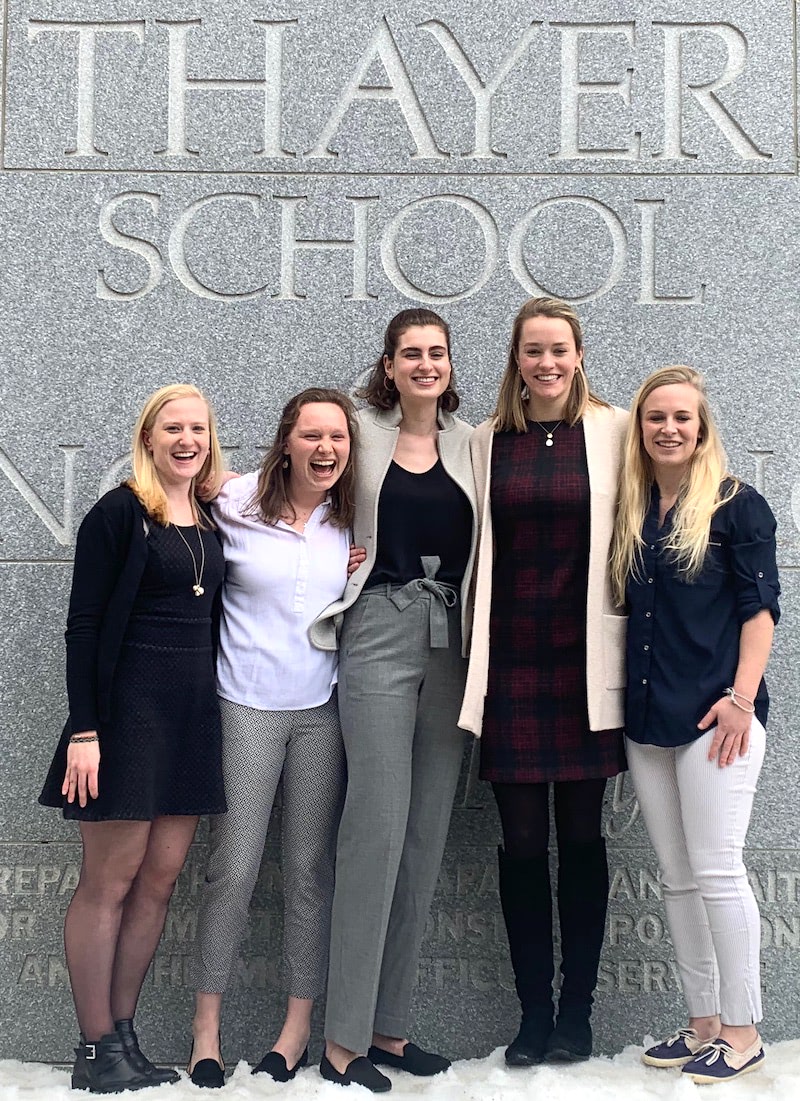- Undergraduate
Bachelor's Degrees
Bachelor of ArtsBachelor of EngineeringDual-Degree ProgramUndergraduate AdmissionsUndergraduate Experience
- Graduate
Graduate Experience
- Research
- Entrepreneurship
- Community
- About
-
Search
All Thayer News
Dartmouth Engineering Students Design Hospital Sensory Pod for Special-Needs Children
Jul 06, 2020 | by Julie Bonette
Dartmouth's Cook Engineering Design Center (CEDC) partners students with local industry and organizations to design solutions to real world problems. This year, several projects aimed to address the unmet needs of vulnerable populations in the Upper Valley. One such project was a pod designed to help children with sensory processing challenges (SPCs) feel more comfortable in the hospital.
“At the start of the project, I had an idea that developing a sensory pod for hospital waiting rooms would be helpful,” said Sophie Palmer ’20. “But I had no idea how needed it actually is.”

(l to r) Julia Marcotte ’20 Th’20, Sophie Frey ’20, Sophie Palmer ’20, Rebecca Thomson ’20, and Taylor Ward ’19 Th’20
Palmer and four other Dartmouth engineering students—Sophie Frey ’20, Julia Marcotte ’20 Th’20, Rebecca Thomson ’20, and Taylor Ward ’19 Th’20—decided to design a pod to help de-escalate children and young people who are triggered at the hospital through supportive accessories such as noise-canceling headphones.
Final design plans for "SensorySpot" are now in the hands of the project’s sponsors: Special Needs Support Center (SNSC) and the Children’s Hospital at Dartmouth-Hitchcock (CHaD).
“The team’s work on behalf of children with autism spectrum disorders and other sensory and behavioral challenges was innovative and compelling, reflecting a depth of research, purpose, design, and pragmatic implementation,” said Laura Perez, SNSC executive director. “The SensorySpot project was a perfect fit with our work of creating sensory friendly spaces in the Upper Valley to help the community move beyond awareness and to foster an authentic appreciation of neurodiversity."
The team worked closely through fall and winter terms with the sponsors to understand the clients’ and community’s needs. First, they researched similar rooms popping up in stadiums and airports across the world for those with SPCs, and they then created a flexible SensorySpot prototype that could be easily sanitized. In late January, they hosted an event at Dartmouth for children with SPCs to test the prototype and receive feedback.
"Every conversation we had where someone said, ‘Thank you for doing this,’ it just warmed your heart every time.”
“It was definitely emotional,” said Marcotte of speaking with the children’s parents who attended the event. “We realized we have the opportunity to change lives and provide better health care to a population that desperately needs it. And so every conversation we had where someone said, ‘Thank you for doing this,’ it just warmed your heart every time.”
The team’s efforts earned them the Brieanna S. Weinstein Engineering Design Prize, presented annually to an engineering student or student team who has demonstrated outstanding skill in developing or creating new technologies, systems, or devices to address the needs or challenges of people with physical or developmental disabilities.
Other recent CEDC projects include a robocar that aids people with blindness or low vision, and an easy-to-use field-ready virus surveillance tool.
For contacts and other media information visit our Media Resources page.
